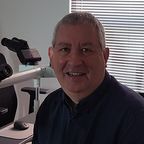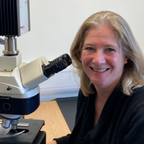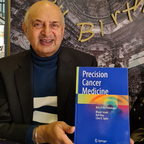Cellular Pathology
Spatial Transcriptomics: A novel tool to elucidate cell populations in non-melanoma skin cancer
Cellular Pathology
Spatial Transcriptomics: A novel tool to elucidate cell populations in non-melanoma skin cancer
9am – 9.30am BST, 26 September 2023 ‐ 30 mins
Cellular Pathology
Abstract
Non-melanoma skin cancers (NMSC) are on the rise, with around 156,000 cases diagnosed annually in the United Kingdom. Basal cell carcinoma (BCC) is the most predominant form that is encountered, and cutaneous squamous cell carcinoma (cSCC) accounts for 20% of all non-melanoma skin cancers. Although the vast majority of non-melanoma skin cancers have a good prognosis and can be cured by surgical intervention, they can cause the destruction of local tissue architecture due to tumour growth. Moreover, a small subset of tumours have poorer outcomes with metastases and mortality.
The underlying biological mechanisms governing a higher risk of recurrence, metastasis, and death remain poorly understood due to a lack of accurate risk stratification. Risk prediction is important in the management of NMSC, as it informs which patients require imaging, how frequently imaging should be performed and how frequently patients should be reviewed. It also informs which patients will benefit from wider surgical resection, adjuvant radiotherapy or sentinel lymph node biopsy. In the future, there is a role for the use of adjuvant immunotherapy for patients with particularly high-risk tumours. This presentation aims to highlight the use of single-cell and spatial transcriptomics analysis approaches in comprehensively mapping the localisation of the different cellular subpopulations in non-melanoma skin cancers. The ultimate aim is to develop better diagnostic tools and markers to predict patient risk status, which will lead to better clinical outcomes.
Learning outcomes
Delegates will:
- Understand what spatial transcriptomics is
- Know the different methodologies available
- Appreciate how it can be utilised to better understand non-melanoma skin cancer
- Describe the benefits and disadvantages of spatial transcriptomics
Speakers

Introduction of Digital Image Analysis into EQA Assessments
Cellular Pathology
Introduction of Digital Image Analysis into EQA Assessments
9.30am – 10am BST, 26 September 2023 ‐ 30 mins
Cellular Pathology
Abstract
Digital imaging for remote viewing to enable reporting is becoming increasingly prevalent in the NHS cellular pathology services. Sea change levels of improvement in the technology that enables digital image acquisition, viewing, transfer and storage has allowed its widespread deployment and adoption and concomitant to this has been the development of software applications to enable the analysis of those digital images for a huge variety of reasons.
In my talk I will discuss the application of digital image analysis to the scans of the slides that we assess as part of our routine external quality assessment (EQA) workload. Both as aids to improve the information and the accuracy of that information e.g., in the assessment of the proliferation marker Ki-67 in breast cancer to improve its use as a prognostic marker, and as a tool to verify and quality control our own processes and EQA materials e.g., the measurement of reproducibility and homogeneity in tissue and cell line samples used in the assessment of PD-L1 immunohistochemistry staining in non-small cell lung cancer.
Learning outcomes
Delegates attending this presentation will:
- Receive an overview of how the introduction to Image Analysis is enhancing the UK NEQAS ICC Scheme assessments and future reports
- Understand the UK NEQAS ICC assessment process and how the qualitative assessment is now being further complemented by quantitative data using image analysis.
Speakers

Andrew Dodson MPhil, FIBMS, CSci
Scheme Director, UK NEQAS Immunocytochemistry & In-Situ Hybridisation (ICC & ISH)
The Introduction of Digital Pathology EQA
Cellular Pathology
The Introduction of Digital Pathology EQA
10.30am – 11am BST, 26 September 2023 ‐ 30 mins
Cellular Pathology
Learning outcomes
Delegates attending this session will learn about and gain knowledge on the introduction and application of the new EQA scheme to cover digital pathology in Cellular Pathology.
Speakers

The reality of digital pathology implementation
Cellular Pathology
The reality of digital pathology implementation
11am – 11.30am BST, 26 September 2023 ‐ 30 mins
Cellular Pathology
Learning outcomes
This presentation will support the introduction of the Digital Pathology EQA explaining the assessment criteria and how the technical issues may be overcome in a routine laboratory.
Speakers
Louise Dolan
Deputy Laboratory Manager, Digital Pathology Lead, Northern Lincolnshire & Goole NHS Trust
The need for end to end QC in digital histopathology and artificial intelligence
Cellular Pathology
The need for end to end QC in digital histopathology and artificial intelligence
11.30am – 12pm BST, 26 September 2023 ‐ 30 mins
Cellular Pathology
Abstract
Histopathology has numerous stages in the production of a digital image and its subsequent use. Each of the stages can introduce variations that are compounded resulting in a net variation in image quality for nominally the same tissue. Humans are tolerant of variation so this variation in quality has minimal impact on outcomes, which are additionally validated by EQA services.
But AI is in some cases being negatively impacted by variation and highlights the need for quality metrics and subsequently standards for each stage, where possible. But currently there are few independent QC tools for digital histopathology. This presentation will present the results of our work in NPIC were we have developed QC tools for staining, digitisation and display in digital histopathology.
Learning outcomes
Delegates will:
- Understand the quality issues relating to digital pathology
- Understand the quality issues relating to artificial intelligence in the laboratory
- Have knowledge of how to mitigate these issues
Speakers

Professor David Brettle
Trust Chief Scientific Officer, National Pathology Imaging Cooperative
Designing and automating a modern Mohs laboratory
Cellular Pathology
Designing and automating a modern Mohs laboratory
9am – 9.30am BST, 27 September 2023 ‐ 30 mins
Cellular Pathology
Learning outcomes
- Develop an understanding of the required equipment used in a modern Mohs laboratory
- Understand how to embrace design and automation in a modern Mohs laboratory.
- Understand the required skills while they are using automated and advanced equipment in Mohs laboratory.
- To be aware how automated and advanced equipment will provide enhanced and more accurate results and improve quality performance.
Speakers

Complex and unusual case studies in Mohs
Cellular Pathology
Complex and unusual case studies in Mohs
9.30am – 10am BST, 27 September 2023 ‐ 30 mins
Cellular Pathology
Learning outcomes
Delegates will:
- Gain an appreciation of the diversity and range of tumour types that can be assessed using Mohs.
- Comprehend the complexity of technical requirements to ensure cases are dealt with effectively.
- Recognise unusual findings and be able to adjust the investigative procedures in a 'live' setting
- Appreciate tumour pattern recognition in Mohs cases
Speakers

Application and imaging of direct immunofluorescence
Cellular Pathology
Application and imaging of direct immunofluorescence
10.30am – 11am BST, 27 September 2023 ‐ 30 mins
Cellular Pathology
Abstract
Direct immunofluorescence (DIF) techniques provide the gold standard diagnostic tests for a number of autoimmune immunobullous diseases, including pemphigus and pemphigoid and have clinical utility in other autoantibody-mediated disorders. They are typically performed on unfixed, frozen skin, mucosal and renal biopsies. For optimal diagnostic value, material for DIF requires careful preparation and a number of factors contribute to the quality of the assessed tissue sections. In particular, weak specific fluorescence intensity and high non-specific background fluorescence can hinder accurate interpretation.
This presentation will provide a brief overview of best practice for optimising DIF performance, with a focus on skin and mucosal biopsies. Troubleshooting and helpful tips will be provided covering areas including specimen preparation and the importance of using an appropriate transport medium, rinsing considerations prior to block preparation, factors influencing embedding and cryotomy, protocols for optimising fluorescence and appropriate use of conjugates, imaging considerations for digital pathology solutions, storage of material prior to reporting and best practice strategies for maintaining internal and external quality control, with reference to the NEQAS CPT DIF EQA scheme.
Learning outcomes
This presentation will provide a brief overview of best practice for optimising performance of direct immunofluorescence on skin and mucosal biopsies, including troubleshooting and helpful tips on specimen preparation, processing, quality control, imaging and storage of specimens and material.
Speakers

The role of electron microscopy in renal transplant pathology
Cellular Pathology
The role of electron microscopy in renal transplant pathology
11am – 11.30am BST, 27 September 2023 ‐ 30 mins
Cellular Pathology
Abstract
Electron microscopy is essential for the diagnosis of a range of medical renal disorders, and its use is detecting immune deposits and basement membranes changes in native kideny biopsies will be familiar to many biomedical scientists and pathologists. EM is also used in the assessment of renal transplant biopsies.
In cases of recurrent disease the features are similar to those seen in native kidneys, but there are also specific features only seen in the transplant setting. This talk will focus on the utility of EM in renal transplant biopsies, demonstrating examples from relevant cases.
Speakers

Dr Owen Cain
Consultant Histopathologist, University Hospitals Birmingham NHS Foundation Trust
Beverley Whitehouse
Specialist Healthcare Scientist - Electron Microscopy, University Hospitals Birmingham NHS Foundation Trust
Amyloid: Rigour is essential for diagnosis
Cellular Pathology
Amyloid: Rigour is essential for diagnosis
11.30am – 12pm BST, 27 September 2023 ‐ 30 mins
Cellular Pathology
Abstract
Amyloidosis is disease caused by extracellular deposition in the tissues of abnormal protein in a characteristic fibrillar form known as amyloid. Early and correct diagnosis is essential so that patients benefit from appropriate and timely treatment.
The presentation will highlight the need for rigour in the demonstration of amyloid, new techniques, research, diagnosis and treatment.
Learning outcomes
This presentation will cover:
- Amyloid
- demonstration
- troubleshooting
- best practice and interpretation
Speakers

Janet Gilbertson
Principal Scientist, National Amyloidosis Centre, Royal Free NHS Foundation Trust
Pre-Analytical – Tissue Requirements/Fixation – To enable molecular pathology
Cellular Pathology
Pre-Analytical – Tissue Requirements/Fixation – To enable molecular pathology
2pm – 2.30pm BST, 27 September 2023 ‐ 30 mins
Cellular Pathology
Learning outcomes
This presentation will give delegates attending an:
- Overview of the pre-analytical processing pathway and potential risks associated with each stage.
- Historical/current/prospective optimisation of the pre-analytical pathway.
- Understanding of the near-future perspectives for standardisation-will technologies such image analysis and spatial profiling affect the practice of pathology laboratories.
Speakers
Brendan O'Sullivan
Operations Manager in Molecular Pathology , University Hospitals Birmingham NHS Foundation Trust
Pre-Analytical – Tissue Requirements / Fixation – to enable molecular pathology
Cellular Pathology
Pre-Analytical – Tissue Requirements / Fixation – to enable molecular pathology
2.30pm – 3pm BST, 27 September 2023 ‐ 30 mins
Cellular Pathology
Abstract
NGS for molecular profiling of cancer in routine practice.
There is legitimate expectation that molecular profiling of cancers can bring precious information to guide the treatment.
The clinically relevant alterations are of varied types: gene mutations, copy numbers, rearrangements, but also protein levels of expression. Profiling of tumours in routine practice is complex logistically, due to the high number of patients and targets, the small size of the samples and the quick turn around time required. An exhaustive assessment requires a variety of platforms.
Furthermore, it becomes relevant to repeat profiling on tissue and on blood during the patient’s treatment.
Next Generation Sequencing (NGS) offers the possibility of multiplex testing, with high sensitivity and specificity. There are multiple approaches: whole genome sequencing, whole exome sequencing and panels of varied sizes.
In practice, the focus is to concentrate on providing an exhaustive clinically relevant assessment for all patients, which is guided, for each type of tumour, by WHO and NICE or equivalent guidelines.
There has been initially an excess of enthusiasm about what NGS could offer in routine practice; the technology had yet not reached the stage of being implementable within clinical practice without significantly destabilising the management.
However, thanks to significant improvement, including automation of the process, efficient IT and Bioinformatics, NGS is now safely implementable.
Pending a coherent political and funding approach, molecular diagnostic laboratories are able to provide high throughout sequencing of tumours on real life tissue samples and on blood.
It is important to mention that the molecular diagnostic laboratories also need to maintain single gene testing, immunohistochemistry, FISH and to implement artificial intelligence based assays on tissue, which will be essential and complementary to NGS testing.
The results of the molecular profiling will need to be transcribed in a comprehensive, integrated and clinically relevant report.
Speakers

Dr Phillipe Taniere
Clinical Service Lead for Molecular Pathology, University Hospitals Birmingham NHS Foundation Trust
The molecular testing for precision medicines in Thoracic Cancer
Cellular Pathology
The molecular testing for precision medicines in Thoracic Cancer
3pm – 3.30pm BST, 27 September 2023 ‐ 30 mins
Cellular Pathology
Learning outcomes
This presentation will give delegates attending an:
- Overview of the pre-analytical processing pathway and potential risks associated with each stage.
- Historical/current/prospective optimisation of the pre-analytical pathway.
- Understanding of the near-future perspectives for standardisation-will technologies such image analysis and spatial profiling affect the practice of pathology laboratories.
Speakers
Professor Dean Fennell
Professor & Consultant in Thoracic Medicine , University Hospitals of Leicester
Origin of immunohistochemistry
Cellular Pathology
Origin of immunohistochemistry
4pm – 4.30pm BST, 27 September 2023 ‐ 30 mins
Cellular Pathology
Abstract
It is helpful to understand the origin of immunohistochemistry in order to appreciate its remarkable success and growth as an art and science of detecting tissue antigens, since its advent some 80 years ago. Its success has been based on a) pioneering work on antibody mediated detection of antigens by eminent scientists such as Emil von Behring, R Kraus, Paul Ehrlich, Michael Heidelberger and John R Marrack, b) the development of prototype immunocytochemical techniques of direct and indirect immunofluorescent and immunoperoxidase techniques by Albert Coons and Paul Nakane & Stratis Avrameas, respectively, and c) improvements in the detection system’s sensitivity and specificity by Ludwig Sternberger, Si-Ming Hsu & Jasani et al, respectively. For its widespread use in pathology and biomedical research, the initial credit is deserved by Clive Taylor for paving the way in 1974 towards the use of immunoperoxidase methods on formalin-fixed paraffin embedded tissue sections, and his colleague Shan-Rong Shi for opening up of the scope for its universal application through his discovery in 1991 of heat mediated antigen retrieval principle. The next crucial boost in the value and growth in the use of immunohistochemistry has come through the need to adapt its use from a manually applied staining method for detecting diagnostically important cancer antigens to a sophisticated automated methodology for detection of prognostic and therapeutic biomarkers.
This has required corporate effort between individual biomedical and clinical scientists and their academic institutions, with facilitatory input from major biopharmaceutical companies as well as various regulatory bodies and external quality assurance bodies, leading to a multi-billion industry projected to grow to a 5 billion dollar market over the next 10 years.
The talk will focus largely on the contributions of individual biomedical scientists, and is dedicated to recognize the pivotal role of external quality assurance schemes such as UKNEQAS for Immunohistochemistry and In Situ Hybridisation, for helping to improve and sustain the trustworthiness and reliability of immunohistochemistry as a clinical science.(322 words)
Learning outcomes
Delegates attending this presentation will:
- Receive an overview of the clinical history of MMR/Lynch Syndrome, EQA and data from UK NEQAS ICC & ISH
- Gain a better understanding of the importance of MMR testing and the UK NEQAS ICC & ISH assessment process.
The presentation will also focus on acceptable and not acceptable tests, and the importance of ideal controls.
Speakers

UK NEQAS ICC: PDL1 and EQA
Cellular Pathology
UK NEQAS ICC: PDL1 and EQA
4.30pm – 5pm BST, 27 September 2023 ‐ 30 mins
Cellular Pathology
Learning outcomes
This presentation will focus on the PD-L1 clones used for the different indications, acceptable and not acceptable tests, and the importance of ideal controls.
Delegates attending this presentation will:
- Receive an overview of PD-L1 EQA assessments carried out by UK NEQAS ICC & ISH
- Gain a better understanding of the UK NEQAS PD-L1 schemes and how assessments are carried out.
Speakers

Dawn Wilkinson
Deputy Scheme Manager , UK NEQAS Immunocytochemistry & In-Situ Hybridisation (ICC & ISH)
Troubleshooting specialist demonstration techniques
Cellular Pathology
Troubleshooting specialist demonstration techniques
9am – 9.30am BST, 28 September 2023 ‐ 30 mins
Cellular Pathology
Learning outcomes
This interactive presentation will discuss general demonstration techniques, troubleshooting, and how to make the best out of the feedback you receive from your UK NEQAS CPT Results reports. The content will also cover – how to manage SOPs, importance of understanding mechanisms of action and uses of stains, recording, monitoring, and trending of IQC failures and use of UK NEQAS CPT resources to help improve staining.
There will also be an opportunity for delegates to join in and score examples of stained slides against the UK NEQAS CPT assessment criteria.
Speakers
A Quality Culture - supporting daily quality and compliance
Cellular Pathology
A Quality Culture - supporting daily quality and compliance
9.30am – 10am BST, 28 September 2023 ‐ 30 mins
Cellular Pathology
Learning outcomes
Delegates will understand:
- What is a quality culture.
- Importance of obtaining and maintaining ISO accreditation.
- Maintaining and improving quality and compliance.
- Key tips for supporting daily quality and compliance.
Speakers
Chantell Hodgson
Scheme Manager , LabXCell CEO and UK NEQAS Cellular Pathology Technique (CPT) Scheme Director UK NEQAS for CPT
A success story in reporting qualification - dermatopathology
Cellular Pathology
A success story in reporting qualification - dermatopathology
10.30am – 11am BST, 28 September 2023 ‐ 30 mins
Cellular Pathology
Abstract
The advanced specialist diploma in dermatopathology reporting is fully supported by Health Education England and is a pioneering role which is helping to reduce the demand-capacity problems that currently exist within histopathology and specifically dermatopathology.
I am currently working as a consultant healthcare scientist as part of the histopathology reporting team at University Hospitals Plymouth NHS Trust, specialising in dermatopathology
I was in the first cohort for Dermatopathology reporting and the first to be awarded the qualification. The qualification was developed jointly by the RCPath and the IBMS and has been designed to mirror that of the histopathology medical trainees with four stages A-D. There are two exams- one at the end of stage A and one at the end of stage C. Further, a portfolio of evidence is assessed at each stage in order to progress. To be eligible to apply for the qualification applicants must be a Member or Fellow of the IBMS, a HCPC registered biomedical or clinical scientist, with at least five years’ experience post-registration experience .
I began studying towards the advanced specialist diploma in dermatopathology reporting in November 2017 and successfully completed the qualification in February 2023.
My experience of training towards this qualification has been very positive and rewarding. It has been a difficult journey at times as the qualification is new, but now that it is established, many of the initial issues have been resolved. My role as a Consultant Healthcare Scientist reporter is now firmly established within the department and within the skin team at the hospital. I have excellent working relationships with my colleagues and feel supported and respected.
Learning outcomes
By drawing on the speaker’s experience of successfully completing the Advanced Specialist Diploma in Dermatopathology Reporting, delegates will learn how this qualification benefited the speaker's career development including information on the structure of the course, how to apply and the experience and qualifications required.
Speakers

Madeleine Stephens
Consultant Healthcare Scientist, University Hospitals Plymouth NHS Trust
New Advanced Specialist Diploma in Histopathology Reporting Qualifications
Cellular Pathology
New Advanced Specialist Diploma in Histopathology Reporting Qualifications
11am – 11.30am BST, 28 September 2023 ‐ 30 mins
Cellular Pathology
Abstract
The session will provide an overview of the Histopathology Reporting qualifications outlining the success so far and then will focus on the new limited scope Reporting qualification for those involved in Cervical Screening. It will provide guidance on the eligibility criteria for this qualification, the portfolio requirements and the support needed by candidates from colleagues in order to undertake the qualification.
Speakers

Training of individuals undertaking dissection qualification
Cellular Pathology
Training of individuals undertaking dissection qualification
11.30am – 12pm BST, 28 September 2023 ‐ 30 mins
Cellular Pathology
Learning outcomes
Delegates attending this presentation will gain knowledge on:
- Assessing personal development required (gap analysis)
- Outline of a training plan to complete all aspects of portfolio
- How to structure and present evidence for the portfolio
- Practical methods of dissection, utilising equipment, standardising descriptions etc.
Abstract
Training for Biomedical Scientists is a fast-growing field and has become a crucial factor in the efficiency of histopathology departments. It has many benefits from improving turnaround times, career progression and utilising Pathologist’s time more effectively. As more Biomedical Scientists are performing dissection the responsibility to teach, and train is down to the already practicing BMS dissectors rather than the Pathologists. It is imperative that training is performed correctly and suitably for the individuals, the patients, and the department as a whole. Many aspects need to be considered to deliver effective training and being fully prepared and organised for training can make the process a successful one.
Speakers
Cassandra Cooklynn
Dissection Practitioner , Mersey and West Lancashire Teaching Hospitals NHS Trust
Meet the Examiners Session
Cellular Pathology
Meet the Examiners Session
12.45pm – 1.45pm BST, 28 September 2023 ‐ 1 hour
Cellular Pathology
Speakers
Dr Matt Griffiths
Principal Lecturer in Cellular Pathology, Nottingham Trent University

David Muskett
Mastectomy specimen for multifocal invasive ductal carcinoma (11115/20)
Cellular Pathology
Mastectomy specimen for multifocal invasive ductal carcinoma (11115/20)
2pm – 2.20pm BST, 28 September 2023 ‐ 20 mins
Cellular Pathology
Abstract
This presentation will examine a specific case study submitted as part of the 'Advanced Specialist Diploma in Breast Pathology'. The case in question was a mastectomy sample for the treatment of diffuse multifocal invasive ductal carcinoma.
Within the presentation I intend to highlight the importance of pre-analysis and emphasise its correlation with macroscopic examination and block sampling. I will also highlight the importance of post analysis and the understanding of how the role of the Advanced Practitioner can directly impact patient treatment.
Learning outcomes
Through the discussion of a case presented for the IBMS Advanced Specialist Diploma delegates will understand:
- Best macroscopic correlation
- Combined with clinical history
- Therapeutic outcomes.
Speakers
Ashley Gilchrist
Lead Advanced Practitioner in Histological Dissection, The Royal Marsden NHS Foundation Trust
Stented adenocarcinoma in a young female
Cellular Pathology
Stented adenocarcinoma in a young female
2.20pm – 2.40pm BST, 28 September 2023 ‐ 20 mins
Cellular Pathology
Abstract
Emergency presentation of adenocarcinoma in a young female.
This case study was carried out as part of the Advanced Specialist Diploma in Histological Dissection of Lower GI Pathology. The patient was a 34-year-old female who presented at A&E with sudden onset of abdominal pain and constipation. A CT scan showed multiple colonic polyps and a likely descending colon tumour. The differential diagnosis of the tumour was of an inflammatory process, in view of her young age and negative family history of colorectal cancer. Endoscopic biopsies confirmed the diagnosis of a well to moderately differentiated mucinous adenocarcinoma. A stent was placed to relieve obstructive symptoms and a genetic questionnaire was completed. The patient subsequently underwent a subtotal colectomy in view of the large number of polyps. Histology of the resection specimen showed a circumferential mucinous adenocarcinoma multiple lymph node metastases and lymphovascular invasion, TNM 8 pT3 N2b R0 V0 L1 Pn0.
Routine Mismatch Repair (MMR) immunohistochemistry detected a loss of MSH2 and MSH6, indicating possible Lynch syndrome. Further molecular testing including Microsatellite Instability (MSI) showed that Lynch syndrome was not present, and no genetic explanation could be found as to why the patient developed bowel cancer at a young age. Detection of a KRAS mutation in the tumour cells suggests that treatment with anti-EGFR therapies such as Cetuximab may not be effective in this patient. After discussion of the histology at MDT, the patient was referred to oncology for adjuvant chemotherapy which consisted of 6 months Oxaliplatin and 5-Fluorouracil. The patient completed the course in 2019 and was referred to the surgical team for follow up with CT scans, endoscopy and CEA monitoring.
In summary, this case demonstrates the essential role of appropriate sampling and molecular testing of colonic cancer resection specimens in guiding decisions about the patient’s subsequent treatment.
Speakers

Rebecca Renouf
Trainee Consultant Clinical Scientist , Portsmouth Hospitals University NHS Trust
Gestational Trophoblastic Disease: What’s all the fuss about?
Cellular Pathology
Gestational Trophoblastic Disease: What’s all the fuss about?
2.40pm – 3pm BST, 28 September 2023 ‐ 20 mins
Cellular Pathology
Learning outcomes
Delegates will learn:
- What Gestational trophoblastic disease is, including the different types and how they arise
- How to handle a sample at the dissection bench including comparison with normal products of conception
- How to distinguish between the different types of disease and mimics
- What a diagnosis of gestational trophoblastic disease means for the patient
- What the malignant entities of Gestational Trophoblastic Disease include
Speakers

Sandie Iles
Advanced Specialist Biomedical Scientist, Imperial College Healthcare NHS Trust
The Lundy Murders – the role and reliability of immunohistochemistry in forensic neuropathology practice
Cellular Pathology
The Lundy Murders – the role and reliability of immunohistochemistry in forensic neuropathology practice
3pm – 3.30pm BST, 28 September 2023 ‐ 30 mins
Cellular Pathology
Abstract
Mark Lundy was convicted of killing his wife and daughter in 2002 and again in 2015 after a retrial ordered by the Privy Council. His conviction continues to divide public opinion in New Zealand. A key piece of evidence was the presence of small smears on a shirt which prosecution experts identified as central nervous system tissue relying on immunohistochemistry.
The successful challenge to his original conviction was part motivated by arguments challenging the reliability of the latter in forensic practice. This has again come under scrutiny following a 2016 report by the US President’s Council of Advisors on Science and Technology. The PCAST concluded that there were two important deficiencies in ensuring scientific validity of so-called ‘feature-comparison methods’. These are procedures by which an examiner seeks to determine whether an evidentiary sample is or is not associated with a source sample based on similar features. Proponents of Lundy’s innocence argue that the application of immunohistochemistry must be regarded as a subjective feature-comparison method.
There was a need for (1) clarity about the scientific standards for the validity and reliability of forensic methods and (2) the need to evaluate specific forensic methods to determine whether they have been scientifically established to be valid and reliable. The report emphasized 2 key elements that are required to meet the scientific criteria of foundation validity; (1) a reproducible and consistent procedure and (2) empirical measurements from multiple independent studies of a method’s false positive rate and sensitivity.
It is this author’s position that the manner in which the immunohistochemistry was applied in the Lundy case to identify central nervous system tissue was sufficiently robust in terms of rigor and reproducibility and that to insist otherwise would be tantamount to believing in biological alchemy.
Speakers
Dr Daniel du Plessis
Consultant Neuropathologist, Northern Care Alliance (Salford Royal Hospital NHS Foundation Trust)
Opening and Closing Plenary programmes

















